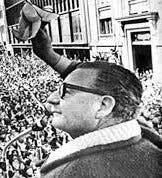Allende and revolutionary democratic socialism
The 50th anniversary of the coup d’état in Chile
From the 1930s to the 1960s, the principle raw materials export from Chile was copper, and the copper mines were owned by two U.S. companies, the Anaconda Copper Co. and the Kennecott Copper Co., which made enormous profits, while Chilean workers in the mines lived in miserable conditions, earning only a fraction of what workers in the United States doing comparable work were earning. Indeed, from the 1930s through the 1960s, Chilean copper expressed the extreme inequalities of the world-system. On the one hand, during this time period, the two principal companies had remitted four billion dollars from Chile to their corporate headquarters, even though they had not invested more than 800 million dollars, and nearly all this investment came from profits earned in Chile. On the other hand, as expressed by Eduardo Galeano in The Open Veins of Latin America, “Chilean minors lived in narrow and sordid cabins, separated from their families, which inhabite…



